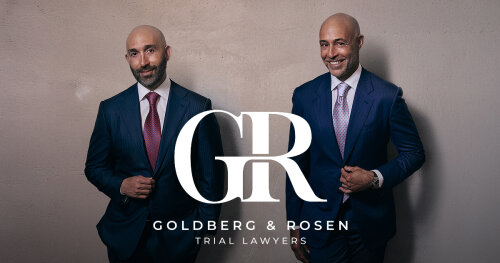Best Legal Malpractice Lawyers in Florida
Share your needs with us, get contacted by law firms.
Free. Takes 2 min.
Or refine your search by selecting a city:
List of the best lawyers in Florida, United States
About Legal Malpractice Law in Florida, United States
Legal malpractice occurs when an attorney fails to provide competent and professional services to a client, resulting in harm or financial loss. In Florida, attorneys are held to specific standards set by both state laws and rules of professional conduct. If a lawyer breaches these standards and their client suffers damages as a direct result, there may be grounds for a legal malpractice claim. Proving legal malpractice in Florida can be complex, requiring proof of both attorney negligence and actual harm suffered by the client due to this negligence.
Why You May Need a Lawyer
You may consider seeking legal assistance if you believe your prior attorney made significant errors that negatively impacted the outcome of your case or caused you financial harm. Common situations include:
- Missing important legal deadlines, such as the statute of limitations
- Failing to appear in court or file necessary documents
- Conflict of interest not disclosed or managed appropriately
- Misuse or mishandling of client funds
- Poor or absent communication regarding important case updates
- Providing incorrect legal advice that leads to unfavorable results
- Settling a case without the client’s consent
Hiring a legal malpractice lawyer can help you understand your rights, evaluate whether your previous attorney’s conduct rises to malpractice, and guide you through the appropriate steps to seek compensation.
Local Laws Overview
Florida law defines legal malpractice as professional negligence by an attorney that causes harm to a client. Some important aspects under Florida law to consider are:
- Statute of Limitations: In Florida, a legal malpractice lawsuit must generally be filed within two years from the time the client knew or should have known of the negligent act. Delays can risk losing your legal rights altogether.
- Elements to Prove: Plaintiffs must show (1) the existence of an attorney-client relationship, (2) attorney’s duty to provide competent representation, (3) breach of that duty, (4) the breach caused harm, and (5) actual damages suffered.
- Expert Testimony: Florida requires expert witnesses to establish the standard of care and show how the attorney’s conduct deviated from this standard.
- Shared Fault: If the client contributed to the negative outcome, any award may be reduced accordingly.
- Remedies: Damages are usually monetary, intended to compensate the client for losses caused by the attorney’s negligence.
Frequently Asked Questions
What is legal malpractice?
Legal malpractice is when an attorney fails to act with the competence and diligence expected of them, and this failure causes harm to the client.
How do I know if I have a legal malpractice case in Florida?
To have a valid case, you must demonstrate that your attorney breached their duty through negligence, and that this directly caused you measurable harm or loss.
What is the time limit to file a legal malpractice claim in Florida?
You generally have two years from the date you discovered or should have discovered the malpractice to file a claim in Florida courts.
What kind of actions can constitute legal malpractice?
Examples include missing filing deadlines, conflicts of interest, inadequate legal advice, unauthorized settlements, and misappropriation of funds.
Do I need to hire an expert to prove legal malpractice?
Yes, Florida typically requires an expert witness to explain the standard of care and whether the attorney fell below it.
Can I recover all my losses through a legal malpractice lawsuit?
You may recover damages directly caused by the malpractice. This does not include hypothetical damages or for outcomes outside the lawyer’s control.
What if I was partially at fault for the outcome?
Florida applies comparative negligence, meaning any award may be reduced if you contributed to the negative result.
How long does a legal malpractice case take in Florida?
The process can vary widely depending on the complexity of the case, but most take several months to a few years to resolve.
How do I prove my attorney-client relationship?
This is usually established by engagement letters, signed contracts, billing statements, or communications related to legal representation.
Does reporting my attorney to the Florida Bar help my case?
Filing a complaint with the Florida Bar can prompt a disciplinary investigation but is separate from seeking damages through a civil lawsuit.
Additional Resources
There are several organizations and agencies in Florida that assist individuals with legal malpractice issues:
- The Florida Bar - Handles attorney discipline and provides information about attorney conduct and filing complaints.
- Florida Bar Lawyer Referral Service - Connects clients with attorneys experienced in legal malpractice claims.
- Florida Courts - Provides information on civil procedures and filing lawsuits in state courts.
- Legal Aid Societies - Certain legal aid organizations may offer guidance or referrals for malpractice claims.
Next Steps
If you believe you have been harmed by your attorney’s negligence in Florida, consider taking the following actions:
- Gather all relevant documents, such as correspondence, contracts, court filings, and billing records relating to your prior legal matter.
- Write down a detailed timeline of events, including any actions or inactions by your former attorney that you believe were improper.
- Consult with a Florida attorney who specializes in legal malpractice as soon as possible to ensure you meet relevant deadlines.
- Inquire about the need for expert witnesses and discuss possible remedies or compensation.
- Decide whether to file a disciplinary complaint with the Florida Bar, file a civil lawsuit, or both, depending on your situation and legal advice.
Navigating a legal malpractice matter can be challenging, but prompt action and informed guidance from a qualified attorney can help you protect your rights and interests.
Lawzana helps you find the best lawyers and law firms in Florida through a curated and pre-screened list of qualified legal professionals. Our platform offers rankings and detailed profiles of attorneys and law firms, allowing you to compare based on practice areas, including Legal Malpractice, experience, and client feedback.
Each profile includes a description of the firm's areas of practice, client reviews, team members and partners, year of establishment, spoken languages, office locations, contact information, social media presence, and any published articles or resources. Most firms on our platform speak English and are experienced in both local and international legal matters.
Get a quote from top-rated law firms in Florida, United States — quickly, securely, and without unnecessary hassle.
Disclaimer:
The information provided on this page is for general informational purposes only and does not constitute legal advice. While we strive to ensure the accuracy and relevance of the content, legal information may change over time, and interpretations of the law can vary. You should always consult with a qualified legal professional for advice specific to your situation.
We disclaim all liability for actions taken or not taken based on the content of this page. If you believe any information is incorrect or outdated, please contact us, and we will review and update it where appropriate.
Browse legal malpractice law firms by city in Florida
Refine your search by selecting a city.












